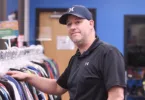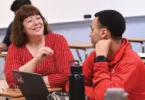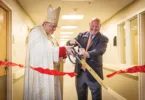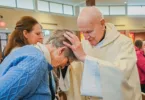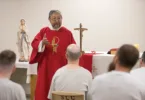by Joe Bollig
joe.bollig@theleaven.org
KANSAS CITY, Kan. — End-of-life decisions can be complicated and difficult, as demonstrated by this example given by a visiting priest and scientist.
A 92-year-old woman who had suffered two heart attacks was back in the nursing home after a hospital stay, but had a failing liver and other problems.
“Look, dearie,” the mother said to her daughter. “I’ve already had two heart attacks, and I’m not really feeling good. If I have another heart attack, do we have to throw me in the back of the ambulance a third time and do all those things again?”
The answers aren’t easy when it comes to hard cases such as the afore-mentioned one, but there are ways to arrive at ethical decisions, said Father Tadeusz Pacholczyk, a scientist and director of education for the Philadelphia-based National Catholic Bioethics Center.
Father Pacholczyk, a priest of the Diocese of Falls River, Mass., visited the Archdiocese of Kansas City in Kansas on Feb. 10 to give two end-of-life workshops, entitled “Making morally informed decisions in serious illness, permanent vegetative state, and at the end of life.”
He presented a four-hour workshop during the day at Savior Pastoral Center to a 150-person audience consisting of pastors, nurses, doctors, social workers, hospital and hospice directors, and several others involved in health care. He presented a two-hour workshop for the general public that evening at St. Patrick Parish in Kansas City, Kan. Both workshops were sponsored by the archdiocesan pro-life office.
Decisions about the end of life need to be made in the context of stewardship over the gift of life, a gift that comes from God, said Father Pacholczyk.
He pointed to the U.S. Conference of Catholic Bishops’ “Ethical and Religious Directives for Catholic Healthcare Services,” which states that although we have a duty to preserve life and use it for the glory of God, this duty is not absolute. We may reject life-prolonging procedures that are insufficiently beneficial or excessively burdensome.
“This is the crux of the matter, the point of focus,” said Father Pacholczyk. “How do you discern when is something insufficiently beneficial, or how do you judge you have reached the point of something being excessively burdensome?”
Our obligation, he said, is to make a good prudential judgment. That is all that God requires of us.
“As we are going to see, making a good prudential judgment is a tricky thing when you have multiple variables in play, when you have a lot of medical data that is coming and going with respect to an individual’s condition,” said Father Pacholczyk. “But at the end of the day, that is what we are challenged to do, to make that good prudential judgment.”
When most people discuss these issues, they are caught between two fears. One is the fear that the health care facility will do too much — attach them to a lot of tubes and machines and refuse to let them die. The second fear is the opposite, that the health care facility will do too little and will unnecessarily hasten their death.
“So, I want to suggest to you the bright line of duty will run basically down the middle of these two fears,” said Father Pacholczyk.
In the past, making good prudential judgments has involved deciding what is “ordinary” or “extraordinary” means. This language is less precise today, so some people prefer to speak of “proportionate” and “disproportionate” means, he said.
Proportionate and disproportionate are better terms because one can ask, “Disproportionate to what?” It adds more clarity to ask what is proportionate to the needs of a particular individual in a particular situation.
“If we’re very careful about how we progress here, we realize the lines are considerably clearer. And, with the help of God, we can make decisions that are indeed good prudential judgments,” said Father Pacholczyk.
The challenge of deciding what is medically proportionate is a balancing act between the benefits and drawbacks, he said. One must also look at the circumstances of persons, places, times and cultures. For example, a feeding tube may be common in Kansas, but not in Haiti. The complexity of cases means they must be decided case by case.
Sometimes people use “living wills” to help decide difficult choices for themselves. These, he said, often use overly broad language and may not address the particular situation a person may find themselves in. The living will can be improved by selecting someone who deeply cares about you as your health care proxy or holder of durable power of attorney.
The question of feeding tubes for nutrition and hydration became part of the national debate over the treatment of Terri Schiavo, a Florida woman who was said to be in a persistent vegetative state. Her husband fought a legal battle to remove her feeding tube and allow her to die from dehydration, and she did die on March 31, 2005.
In general, the presumption is in favor of keeping a feeding tube, said Father Pacholczyk. A feeding tube is seen as a form of caregiving. It is not, however, required for all persons, at all times, in all circumstances. The decision must be made with good prudential judgment according to proportionality.
“It depends on the details,” he said. “Every one of these is a unique prudential judgment we must make, but clearly there will be cases when the tube will not be required.”
Dying involves a lot of people, so it’s important to get a lot of good cross-talk among family and caregivers, he said. If good prudential judgments are made, dying can be a time of healing and forgiveness.
Father Pacholczyk was followed by Dr. Austin Welsh, a geriatrician with the Erickson Health Medical Group in Overland Park. Welsh presented three cases where individuals and families faced end-of-life decisions.
In one case, all it took was a simple administration of antibiotics to clear up a patient’s confusion. He died two months later, but it wasn’t because he was denied care.
“This goes back to what Father [Pacholczyk] talked about,” said Walsh. “That two months was very important, because, by bringing him back, there was a lot of healing. That was a time when there was growth in dying, and the wife was very grateful.”

